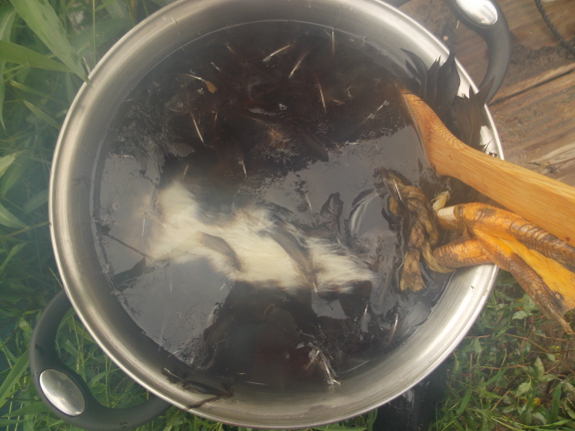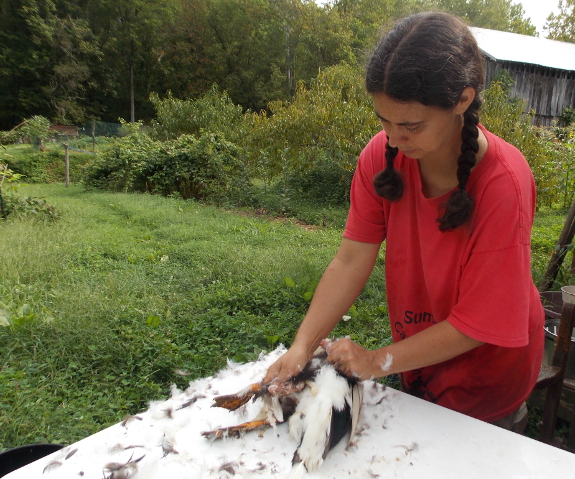
Two ways to pluck a duck

I put it off and put it
off and put it off, but eventually the time came to try our hands once
again at killing (and plucking) ducks. By waiting so long, I hoped
that all of the ducks would be done molting (which was true for two of
the three ducks we processed this week). Plus, once September
hits, the garden year is starting to wind down (although there's still
plenty to do), so stealing a morning for poultry butchering seems more
feasible.

You may recall that, last time around, I ended up skinning our duck rather than plucking.
Since then, I accumulated some tips from a reader who prefers to remain
anonymous, the most important of which was --- try heating the scalding
water all the way to boiling rather than stopping at the recommended
temperature. Sure enough, boiling water (and lack of pin feathers)
changed duck plucking from utterly impossible to merely tedious.
We included a generous squirt of dish fluid in the water, roughed up the
duck's feathers while dunking the duck, and then let the duck sit for
several minutes in the hot liquid. This was still insufficient to
allow us to use a power plucker
to remove feathers, but we did manage to kill, pluck, and dress that
duck in 45 man-minutes --- not great by chicken standards, but feasible.

When the time came to
move to duck two, though, I decided to try dry plucking. Damp down
quickly coated my fingers while plucking duck one, and the down was
much more annoying to work around than wet chicken feathers. So I
pulled out handfuls of down before dunking the duck and found that the
down was much more pleasant (if no faster) to remove when dry.
(This method would also have allowed me to save the down for stuffing,
although I was too focused on experimenting with plucking techniques to
do so this time around.) The wing and tail feathers were too tough
to remove dry, though, so I dunked the dunk in the boiling water before
moving on to these larger feathers. The result was a duck
processed in 50 man-minutes, but resulting in a much cleaner carcass
than I managed with duck one.
Duck three was the one
with pin feathers, and I don't want to write about that pain and
suffering here. Ack! I survived (and the duck, obviously,
didn't).
Anyway, to cut a long
story short, my conclusion is --- dry plucking is a little slower than
wet plucking but is much more pleasant. And, whatever it takes,
wait until those ducks stop molting before butchering!
Want more in-depth information? Browse through our books.
Or explore more posts by date or by subject.
About us: Anna Hess and Mark Hamilton spent over a decade living self-sufficiently in the mountains of Virginia before moving north to start over from scratch in the foothills of Ohio. They've experimented with permaculture, no-till gardening, trailersteading, home-based microbusinesses and much more, writing about their adventures in both blogs and books.
Want to be notified when new comments are posted on this page? Click on the RSS button after you add a comment to subscribe to the comment feed, or simply check the box beside "email replies to me" while writing your comment.

Too much work, which is why they probably suggest skinning instead of plucking. Plus you have the added benefit of not having all the fat from the duck in your diet.
Many years ago I cooked a duck for myself and my ex. He shook his head as I was doing it, which I thought was odd at the time, but he never said anything else. The roast duck was beautiful to look at: clear crisp skin, etc. But as I cut into the meat, I discovered that there wasn't enough meat for one person, let alone two. He smiled at me and said he knew that but refused to tell me anything about it. Needless to say I was mad as hell about him not warning me.
I don't know much on this subject, get that out of the way.. But is it possible that it's the breed that you have? I raise muscovy ducks and some mix breed ones. I've never had much of a problem plucking them. It's more work than with chickens, but not as hard a time as you're having. I know you research quite a bit, I don't, so maybe there is a duck breed problem?
Why the added squirt of dish soap? I think the skin of the duck will surely absorb it . . .
I must have missed the reason in the last post, but I hate to think of you eating dish soap. There must be another way.
T --- Muscovies are an entirely different species from other breeds of ducks, so I wonder if that has an impact on their pluckability? The book I read didn't actually say that any breeds were easier to pluck, but your data suggests otherwise....
Terry --- Don't worry; the dish soap gets washed off post plucking. It's meant to cut the oils on the duck feathers that make it so hard for water to penetrate the down.